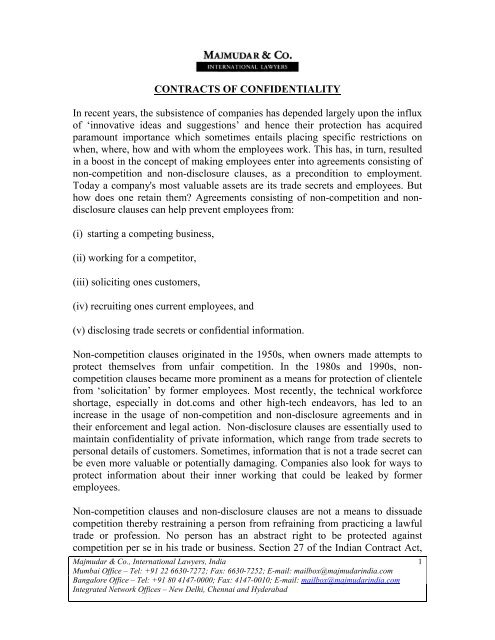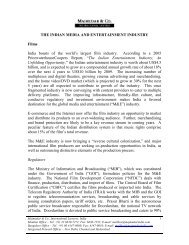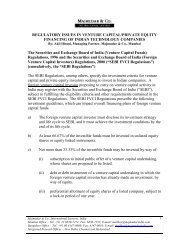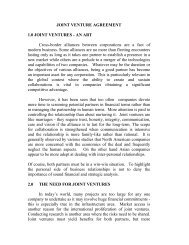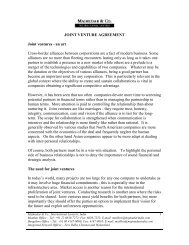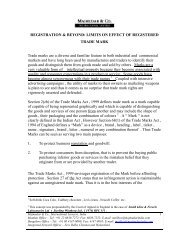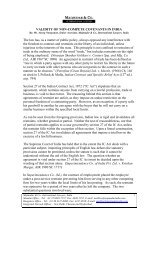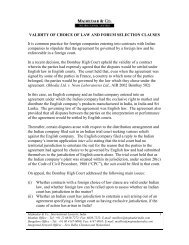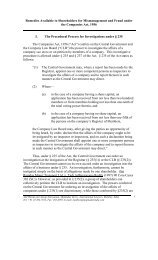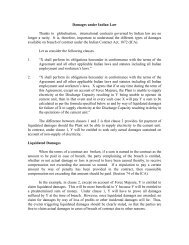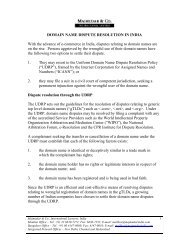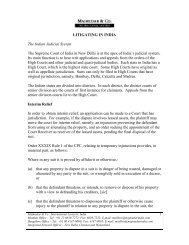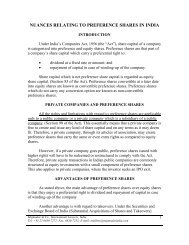Contracts of confidentiality and non-compete with ... - Majmudar & Co.
Contracts of confidentiality and non-compete with ... - Majmudar & Co.
Contracts of confidentiality and non-compete with ... - Majmudar & Co.
You also want an ePaper? Increase the reach of your titles
YUMPU automatically turns print PDFs into web optimized ePapers that Google loves.
CONTRACTS OF CONFIDENTIALITY<br />
In recent years, the subsistence <strong>of</strong> companies has depended largely upon the influx<br />
<strong>of</strong> ‘innovative ideas <strong>and</strong> suggestions’ <strong>and</strong> hence their protection has acquired<br />
paramount importance which sometimes entails placing specific restrictions on<br />
when, where, how <strong>and</strong> <strong>with</strong> whom the employees work. This has, in turn, resulted<br />
in a boost in the concept <strong>of</strong> making employees enter into agreements consisting <strong>of</strong><br />
<strong>non</strong>-competition <strong>and</strong> <strong>non</strong>-disclosure clauses, as a precondition to employment.<br />
Today a company's most valuable assets are its trade secrets <strong>and</strong> employees. But<br />
how does one retain them? Agreements consisting <strong>of</strong> <strong>non</strong>-competition <strong>and</strong> <strong>non</strong>disclosure<br />
clauses can help prevent employees from:<br />
(i) starting a competing business,<br />
(ii) working for a competitor,<br />
(iii) soliciting ones customers,<br />
(iv) recruiting ones current employees, <strong>and</strong><br />
(v) disclosing trade secrets or confidential information.<br />
Non-competition clauses originated in the 1950s, when owners made attempts to<br />
protect themselves from unfair competition. In the 1980s <strong>and</strong> 1990s, <strong>non</strong>competition<br />
clauses became more prominent as a means for protection <strong>of</strong> clientele<br />
from ‘solicitation’ by former employees. Most recently, the technical workforce<br />
shortage, especially in dot.coms <strong>and</strong> other high-tech endeavors, has led to an<br />
increase in the usage <strong>of</strong> <strong>non</strong>-competition <strong>and</strong> <strong>non</strong>-disclosure agreements <strong>and</strong> in<br />
their enforcement <strong>and</strong> legal action. Non-disclosure clauses are essentially used to<br />
maintain <strong>confidentiality</strong> <strong>of</strong> private information, which range from trade secrets to<br />
personal details <strong>of</strong> customers. Sometimes, information that is not a trade secret can<br />
be even more valuable or potentially damaging. <strong>Co</strong>mpanies also look for ways to<br />
protect information about their inner working that could be leaked by former<br />
employees.<br />
Non-competition clauses <strong>and</strong> <strong>non</strong>-disclosure clauses are not a means to dissuade<br />
competition thereby restraining a person from refraining from practicing a lawful<br />
trade or pr<strong>of</strong>ession. No person has an abstract right to be protected against<br />
competition per se in his trade or business. Section 27 <strong>of</strong> the Indian <strong>Co</strong>ntract Act,<br />
<strong>Majmudar</strong> & <strong>Co</strong>., International Lawyers, India 1<br />
Mumbai Office – Tel: +91 22 6630-7272; Fax: 6630-7252; E-mail: mailbox@majmudarindia.com<br />
Bangalore Office – Tel: +91 80 4147-0000; Fax: 4147-0010; E-mail: mailbox@majmudarindia.com<br />
Integrated Network Offices – New Delhi, Chennai <strong>and</strong> Hyderabad
1872 states that agreements in restraint <strong>of</strong> trade are void. The only exception being<br />
in the case <strong>of</strong> sale <strong>of</strong> goodwill <strong>of</strong> a business whereby the buyer may be refrained<br />
from carrying on a similar business, <strong>with</strong>in specified local limits, so long as the<br />
buyer, or any person deriving title to the goodwill from him, carries on a like<br />
business therein, provided such local limits are reasonable.<br />
Validity <strong>of</strong> <strong>confidentiality</strong> agreements<br />
Any agreement in restraint <strong>of</strong> trade is considered void. However, certain restraints<br />
are permitted such as agreements consisting <strong>of</strong> <strong>non</strong>-disclosure <strong>and</strong> <strong>non</strong>competition<br />
clauses. An employee owes certain duties to the employer one among<br />
them being the duty <strong>of</strong> fidelity. It is the duty <strong>of</strong> the employee not disclose to others<br />
or use to his own pr<strong>of</strong>its, trade secrets or confidential information that he learns<br />
during the course <strong>of</strong> employment. Equity awards injunction against such erring<br />
servants <strong>and</strong> common law awards damages. The most common explanation <strong>of</strong> this<br />
duty has been that <strong>of</strong> an implied term in the contract <strong>of</strong> employment. But this has<br />
ceased to be the view <strong>and</strong> now it is based merely on confidence. The principle <strong>of</strong><br />
‘breach <strong>of</strong> confidence’ was used in Saltman Engineering <strong>Co</strong>. v. Campbell<br />
Engineering <strong>Co</strong>. (1963) 3 All. E. R. 413. This was not a case <strong>of</strong> contract, but a<br />
duty not to use information <strong>of</strong> a process was extended to a person receiving<br />
information in circumstances showing confidence, e.g. by one trader to another<br />
<strong>and</strong> the latter making use <strong>of</strong> it by way <strong>of</strong> competition <strong>with</strong> the former (Peter Pan<br />
<strong>Co</strong>rpn. V. <strong>Co</strong>rsets (1963) 3 All. E.R. 402, 406). An employer is thus entitled to<br />
protect confidential information which amounts to a “trade secret” or which<br />
prevents “some personal influence over customers being abused in order to entice<br />
them away” (Faccenda Chicken Ltd. v. Fowler (1987) Ch. 117, 137).<br />
A covenant that is reasonably necessary to protect an employer against the<br />
betrayal <strong>of</strong> trade secrets or confidential information is not void merely because it<br />
unavoidably protects the employer against competition (Schroeder (A) Music<br />
Publishing <strong>Co</strong>. Ltd. v. Macaulay (1974) 3 All. E.R.616). A restraint against<br />
competition is justifiable if its object is to prevent the exploitation <strong>of</strong> trade secrets<br />
that learned by the servant, in the course <strong>of</strong> his employment. An instance <strong>of</strong> this<br />
occurred in Forster & Sons Ltd. v. Suggett ((1918) 35 T. L. R. 87), where a works<br />
manager had knowledge <strong>of</strong> certain confidential methods concerning the correct<br />
mixture <strong>of</strong> gas <strong>and</strong> air in furnaces for making glass <strong>and</strong> glass bottles. It was held in<br />
the above case that a restraint is justifiable if its purpose is to prevent the<br />
exploitation <strong>of</strong> trade secrets <strong>and</strong>/or confidential information. Apart from the<br />
protection <strong>of</strong> trade secrets or confidential information an employer is not entitled<br />
<strong>Majmudar</strong> & <strong>Co</strong>., International Lawyers, India 2<br />
Mumbai Office – Tel: +91 22 6630-7272; Fax: 6630-7252; E-mail: mailbox@majmudarindia.com<br />
Bangalore Office – Tel: +91 80 4147-0000; Fax: 4147-0010; E-mail: mailbox@majmudarindia.com<br />
Integrated Network Offices – New Delhi, Chennai <strong>and</strong> Hyderabad
to restrain an employee from making use after the employment has ceased <strong>of</strong> any<br />
knowledge or skill gained during the period <strong>of</strong> employment (Herbert Morris v.<br />
Saxelby (1916) 1 A. C. 688).<br />
What information is considered confidential?<br />
This brings us to the important question i.e. the kind <strong>of</strong> information that may be<br />
protected vide <strong>confidentiality</strong> agreements. For deciding as to whether a particular<br />
information is capable <strong>of</strong> protection, the <strong>Co</strong>urt will take into consideration two<br />
factors viz. firstly, the nature <strong>of</strong> information sought to be protected <strong>and</strong> secondly,<br />
whether the employer impressed on the employee the confidential nature <strong>of</strong> the<br />
information. Thus, if the so-called secret is nothing more than a special method <strong>of</strong><br />
organization adopted in the business or if only the servant knows a part <strong>of</strong> the<br />
secret whereby its successful exploitation <strong>of</strong> that information by him is impossible,<br />
there can be no valid restraint (Herbert Morris v. Saxelby (1916) 1 A. C. 688).<br />
Thus for an information to be confidential it must have the necessary quality <strong>of</strong><br />
confidence about it <strong>and</strong> should also have been given under circumstances which<br />
imply a degree <strong>of</strong> <strong>confidentiality</strong> about it.<br />
The terms “trade secret” <strong>and</strong> “confidential information” are <strong>of</strong>ten interchanged. A<br />
“trade secret” is any information that derives independent economic value from<br />
not being generally known or readily ascertainable. The Quebec courts have<br />
defined the term “trade secret” as being manufacturing processes <strong>and</strong> recipes. The<br />
term “confidential information” is generally used to describe information<br />
conveniently compiled throughout the years by an individual or a company, such<br />
as a clients list, a marketing strategy based on client’s preferences, a supplier’s list,<br />
pricing information or the financial position <strong>of</strong> a company which may partially<br />
become known on the market place by the mere fact <strong>of</strong> being in business. Not all<br />
information that is available to an employee in the course <strong>of</strong> his work is<br />
confidential in nature. Only those information which are in essence so confidential<br />
that they are assimilated to trade secrets <strong>and</strong> become part <strong>of</strong> the third category<br />
described in the Faccenda case, will enjoy a legal protection.<br />
There are three categories <strong>of</strong> information that are accessible to the employee as<br />
laid down in Faccenda Chicken Ltd. v. Fowler ((1985) 1 All. E.R. 724). The first<br />
category includes things that are <strong>with</strong>in the reach <strong>of</strong> any interested individual.<br />
Such information does not require any kind <strong>of</strong> protection. The next category<br />
consists <strong>of</strong> information must remain confidential during the entire time during<br />
which employment exists because there is an implicit loyalty clause in any lease<br />
<strong>Majmudar</strong> & <strong>Co</strong>., International Lawyers, India 3<br />
Mumbai Office – Tel: +91 22 6630-7272; Fax: 6630-7252; E-mail: mailbox@majmudarindia.com<br />
Bangalore Office – Tel: +91 80 4147-0000; Fax: 4147-0010; E-mail: mailbox@majmudarindia.com<br />
Integrated Network Offices – New Delhi, Chennai <strong>and</strong> Hyderabad
<strong>and</strong> hire <strong>of</strong> work. This prohibits an employee from giving away privileged<br />
information to a competitor. However, once the employment is over, the use <strong>of</strong><br />
skill <strong>and</strong> knowledge acquired while working <strong>with</strong> the former employer is allowed<br />
even when in direct competition. Finally, the only kind <strong>of</strong> information protected<br />
even after the termination <strong>of</strong> work <strong>with</strong> an enterprise is information that is likened<br />
to trade secrets, which are the property <strong>of</strong> the employer.<br />
The springboard theory<br />
In the field <strong>of</strong> protection <strong>of</strong> confidential information <strong>and</strong> trade secrets, it is very<br />
pertinent to mention the doctrine <strong>of</strong> the Springboard theory. This theory has been<br />
expressed as follows in Terrapin Ltd. v. Builders Supply <strong>Co</strong>. (Hayes) Ltd. <strong>and</strong><br />
Others (R.P.C. (1967) p.375).<br />
"... a person who has obtained information in confidence is not allowed to use it as<br />
a springboard for activities detrimental to the person who made the confidential<br />
communication, <strong>and</strong> springboard it remains even when all the features have been<br />
published as can be ascertained by actual inspection by any member <strong>of</strong> the<br />
public... The possessor <strong>of</strong> the confidential information still has a long start over<br />
any member <strong>of</strong> the public... It is, in my view, inherent in the principle upon which<br />
the Saltman case rests that the possessor <strong>of</strong> such information must be placed under<br />
a special disability in the field <strong>of</strong> competition to ensure that he does not get an<br />
unfair start."<br />
When confidential information or trade secrets are leaked to a competitor, the<br />
application <strong>of</strong> the Springboard theory will protect the "head start" <strong>of</strong> the owner <strong>of</strong><br />
this information <strong>and</strong> trade secrets <strong>and</strong> will "set back" those who illegally obtained<br />
access to the information.<br />
Factors on which reasonableness <strong>of</strong> restraint depends<br />
The restraint in order to prevent misuse <strong>of</strong> confidential information has to be<br />
reasonable so that the interest <strong>of</strong> the parties afford adequate protection to the<br />
covenantee, which depends upon two factors <strong>of</strong> time <strong>and</strong> space. As the time <strong>of</strong><br />
restriction lengthens or the space <strong>of</strong> its operation grows, the weight <strong>of</strong> the onus on<br />
the covenantee to justify it grows too. But a restraint for life was held valid in<br />
Fitch v. Dewes ((1921) 2 A. C. 158). An ex-servant confidentially employed in the<br />
manufacture <strong>of</strong> an article under a secret process is under an implied obligation to<br />
his late master not to disclose any knowledge or information as to that secret<br />
process acquired during his employment. This applies to information retained in<br />
<strong>Majmudar</strong> & <strong>Co</strong>., International Lawyers, India 4<br />
Mumbai Office – Tel: +91 22 6630-7272; Fax: 6630-7252; E-mail: mailbox@majmudarindia.com<br />
Bangalore Office – Tel: +91 80 4147-0000; Fax: 4147-0010; E-mail: mailbox@majmudarindia.com<br />
Integrated Network Offices – New Delhi, Chennai <strong>and</strong> Hyderabad
the servant’s memory as well as to information committed to writing <strong>and</strong> existing<br />
in a tangible form (Amber Size & Chemical <strong>Co</strong>. v. Menzel (1913) 2 Ch. 239). A<br />
contract not to divulge a trade secret may be reasonable though unlimited as to<br />
space or time <strong>and</strong> a restraint imposed in order to give effect to such a contract<br />
would apparently be treated in the same way as stated in the Halsbury’s Laws <strong>of</strong><br />
Engl<strong>and</strong>, Vol. 38, p.33 (3 rd Edition).<br />
Remedies<br />
Although an injunction is the most common remedy in cases <strong>of</strong> breach <strong>of</strong><br />
confidential information the confidence can be enforced by damages also<br />
(National Broach & Machine <strong>Co</strong>. v. Churchill Gear Machines Ltd. (1965) 2 All.<br />
E.R.961). In Cranleigh Precision Engineering Ltd. v. Bryant ((1965) 1 W. L. R.<br />
1293, 1311), an injunction was given against a servant who as a servant acquired<br />
confidential information <strong>and</strong> sought to take advantage <strong>of</strong> it after leaving the<br />
service <strong>of</strong> the master. The <strong>Co</strong>urts have awarded damages as compensation even<br />
though the breach committed was innocent (Seager v. <strong>Co</strong>pydex (1967) 2 All. E.R.<br />
415).<br />
The Indian perspective<br />
The Indian perspective in this aspect is based more on common law than on<br />
contractual law. The reason being that Indian law, which is essentially derived<br />
from English law, believes that the concept <strong>of</strong> <strong>confidentiality</strong> is more a concept <strong>of</strong><br />
equity than <strong>of</strong> contract. Hence, there is a very strong reliance on English <strong>Co</strong>mmon<br />
law <strong>and</strong> English case laws. Another factor that points out the inadequacies <strong>of</strong><br />
Indian law in matters relating to ‘<strong>confidentiality</strong>’ is that unlike the United States or<br />
the United Kingdom there is no well defined law to that effect. The United States<br />
has a Uniform Trade Secrets Act (UTSA) to that effect. The theft <strong>of</strong> trade secrets<br />
is now a federal criminal <strong>of</strong>fense in the United States. This is a major development<br />
in the law <strong>of</strong> trade secrets both in the United States as well as internationally. The<br />
Department <strong>of</strong> Justice in the Untied States now has sweeping authority to<br />
prosecute trade secret theft whether it is in the United States, via the Internet, or<br />
outside the United States.<br />
However, the concept <strong>of</strong> ‘<strong>confidentiality</strong>’ is well accepted in India <strong>and</strong> subsequent<br />
agreements for protection <strong>of</strong> confidential information are considered valid. In a<br />
Gujarat case, Sunil Mazumdar v. Aryodaya Spinning & Weaving Mills <strong>Co</strong>. Ltd.<br />
((1964) A. Guj. 115), the Defendant, a qualified technician <strong>and</strong> diploma-holder, in<br />
<strong>Majmudar</strong> & <strong>Co</strong>., International Lawyers, India 5<br />
Mumbai Office – Tel: +91 22 6630-7272; Fax: 6630-7252; E-mail: mailbox@majmudarindia.com<br />
Bangalore Office – Tel: +91 80 4147-0000; Fax: 4147-0010; E-mail: mailbox@majmudarindia.com<br />
Integrated Network Offices – New Delhi, Chennai <strong>and</strong> Hyderabad
textile technology agreed to serve the plaintiff’s spinning mills for 5 years. After<br />
serving for about a year as a Senior Assistant he resigned <strong>and</strong> accepted an<br />
employment in another spinning company on a salary higher than he was getting.<br />
The Plaintiff employed him because <strong>of</strong> his specialized training <strong>and</strong> there was<br />
considerable dearth <strong>of</strong> such trained technicians. The agreement was held valid <strong>and</strong><br />
an injunction to prevent breach <strong>of</strong> negative covenant was granted. But in another<br />
similar case, Magan Lal v. Ambica Mills ((1964) A. Guj. 215), the same court did<br />
not grant an injunction. The reason for upholding restraint against an employee is<br />
to protect the proprietary rights <strong>of</strong> the employer if it is reasonably necessary in the<br />
case <strong>of</strong> trade connections or trade secrets but it is not available if directed to<br />
prevent competition or against the use <strong>of</strong> personal skill <strong>and</strong> knowledge acquired by<br />
the employee in his employers business (Herbert Morris Ltd. v. Saxelby (1916) 1<br />
A. C. 688; (1916-17) All. E.R. 305).<br />
Thus, if the restraint is reasonable then the agreement to that effect is held to be<br />
valid. When drafting <strong>and</strong> applying the clauses pertaining to <strong>confidentiality</strong> it is<br />
essential to consider the factual circumstances relevant to the operation <strong>of</strong> the<br />
clause. If the <strong>Co</strong>urts are <strong>of</strong> the opinion that the purpose <strong>of</strong> the restraint is to inhibit<br />
the employee from leaving his employment or to prevent legitimate competition,<br />
then the clause in question will not be upheld. There is always an implied duty <strong>of</strong><br />
fidelity to the employer that would prevent an employee from using his skill for<br />
the benefit <strong>of</strong> a rival company in cases relating to confidential information. Even<br />
in the absence <strong>of</strong> an agreement or even a clause in an agreement, which restrains a<br />
person from breach <strong>of</strong> confidential information, there is an implied duty <strong>of</strong> fidelity<br />
towards the employer, which prevents breach <strong>of</strong> confidential information.<br />
The jurisprudence <strong>of</strong> <strong>confidentiality</strong> is still in its infancy in India <strong>and</strong> therefore a<br />
resort to the English law <strong>and</strong> decisions <strong>of</strong> various courts on this point will be<br />
useful in underst<strong>and</strong>ing the concept <strong>of</strong> <strong>confidentiality</strong> contracts.<br />
<strong>Majmudar</strong> & <strong>Co</strong>., International Lawyers, India 6<br />
Mumbai Office – Tel: +91 22 6630-7272; Fax: 6630-7252; E-mail: mailbox@majmudarindia.com<br />
Bangalore Office – Tel: +91 80 4147-0000; Fax: 4147-0010; E-mail: mailbox@majmudarindia.com<br />
Integrated Network Offices – New Delhi, Chennai <strong>and</strong> Hyderabad


